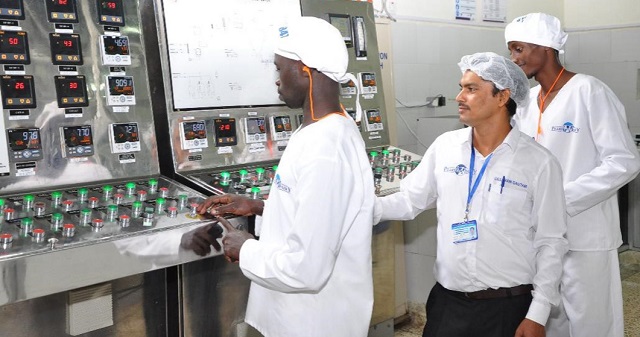
New markets, increased consumption, and stable EAC economy will boost returns, company executives say
Kampala, Uganda | JULIUS BUSINGE | Executives at Pearl Dairy Farms Limited expect a boom in business in the next five years supported by an increase in milk consumption, new markets and the easing of trade restrictions within the East African Community.
Pearl Dairy Farm Ltd’s Managing Director, Seth Devendra, told The Independent in an interview on Oct.06 that the firm has heavily invested in the latest technology for milk processing and are ready to do more as the market for their products expand.
The company opened shop in Uganda in 2013 with production capacity per day standing at 800, 000 litres and employing close to 2,000 people both directly and indirectly.
Davendra said the number of employees has since reduced to 400 due to the effects of COVID-19 and market restrictions in the East African region especially Kenya.
“Uganda is a small market,” he said, adding: “We are continuing to explore new markets in Nigeria and others.”
Davendra said, even if the EAC market remains limited in terms of access, in the next five years, their hope is to have penetrated other good markets in Africa and beyond. Currently the company markets its milk products in Uganda, EAC market, Ethiopia, Malawi, Zambia and Japan. Company executives are exploring new markets of Algeria, Angola and Nigeria.
It specializes in long-life liquid milk with a six months shelf-life and powdered milk at 24 months.
Product innovations, business diversification, political support and a favorable environment are the other reasons the company is basing on to project good growth in the next five years. It has already demonstrated its abilities on this front.
For instance, on Oct.03, it unveiled onto the market five new yoghurt flavors in addition to the already two existing flavors – strawberry and vanilla – at the company’s premises in Mbarara City, South Western Uganda. The new flavours include; apricot, peach, butterscotch, coconut and plain.
State Minister of Finance for Investment and Privatisation, Evelyn Anite, revealed during the new product launch that the milk processor had been given a green light to submit a credit extension request to government through the Uganda Development Bank (UDB) in line with its investment and market plans.
“I am happy it is a product that is made in Uganda,” Anite said after unveiling the new yoghurt flavors. She added: “The flavors are all very good.”
She said supporting processors like Pearl Dairy was in line with the government’s programmes of job creation, export promotion, and social economic transformation.
Anite said the government would continue to provide reliable and affordable electricity to processors and to aid access to local, regional and international markets.
She said there are many trading and bilateral agreements that have been signed by the government of Uganda and other trading partners that await implementation. These will support growth of business for processors.
Pearl has since last year been facing market access challenges in Kenya, one of its largest consumers of its products after authorities moved to block the entry of milk products from Uganda.
“Some of our regional market especially Kenya got issues last year but we are working hard to resolve those issues,” Anite said, adding: “I will inform the President about it.”
She also said the easing of COVID-19 lockdown/restrictions that has seen the reopening of the airport and other sectors of the economy will boost demand and exports for milk products.
Devendra said the launch of the new flavors means they are committed to investing more in Uganda and to add value to the milk and create opportunities. He told The Independent that approx. $1.2m (Shs4.4bn) was invested in the firm’s processing lines to aid the production of the new flavors.
In 2019, the company purchased 142million litres of milk but, because of COVID-19 restrictions, the market has been distorted and only 32million litres of milk had been bought in the first nine months of 2020.
On average, company pays farmers Shs700 per litre of milk through their umbrella cooperatives.
“The farmers have milk but the market is limited,” he said.
Devendra said that the easing of COVID-19 restrictions has seen the market gain momentum and is optimistic the future is bright for the business and the farmers.
He said the company enjoys 20% market share for the dairy sector. It had resumed selling limited quantities of milk to Kenya as authorities in the two countries (Uganda and Kenya) work out a mechanism to resolve the current market impasse.
Diversification
Last month, the company announced it was investing an estimated Shs10bn ($2.73m) in commercial honey farming in collaboration with local dairy farmers. The move, executives said would protect farmers’ income in the event that challenges related to milk production and processing prevail. The honey project seeks to reach more than 10,000 farmers in the western region to produce more than 1,000 metric tonnes of verified and high-quality raw honey for the local and international markets.
****
 The Independent Uganda: You get the Truth we Pay the Price
The Independent Uganda: You get the Truth we Pay the Price



